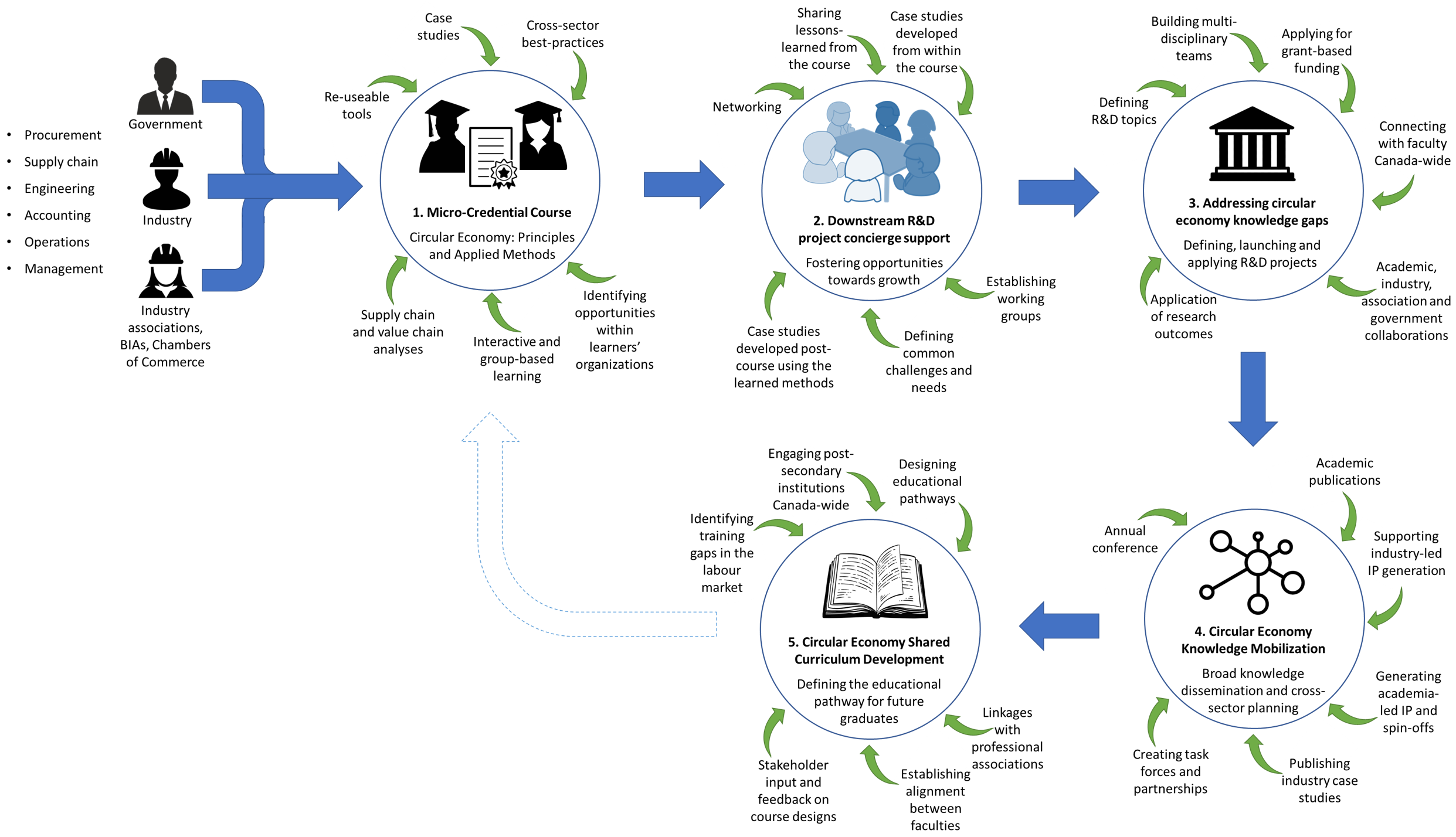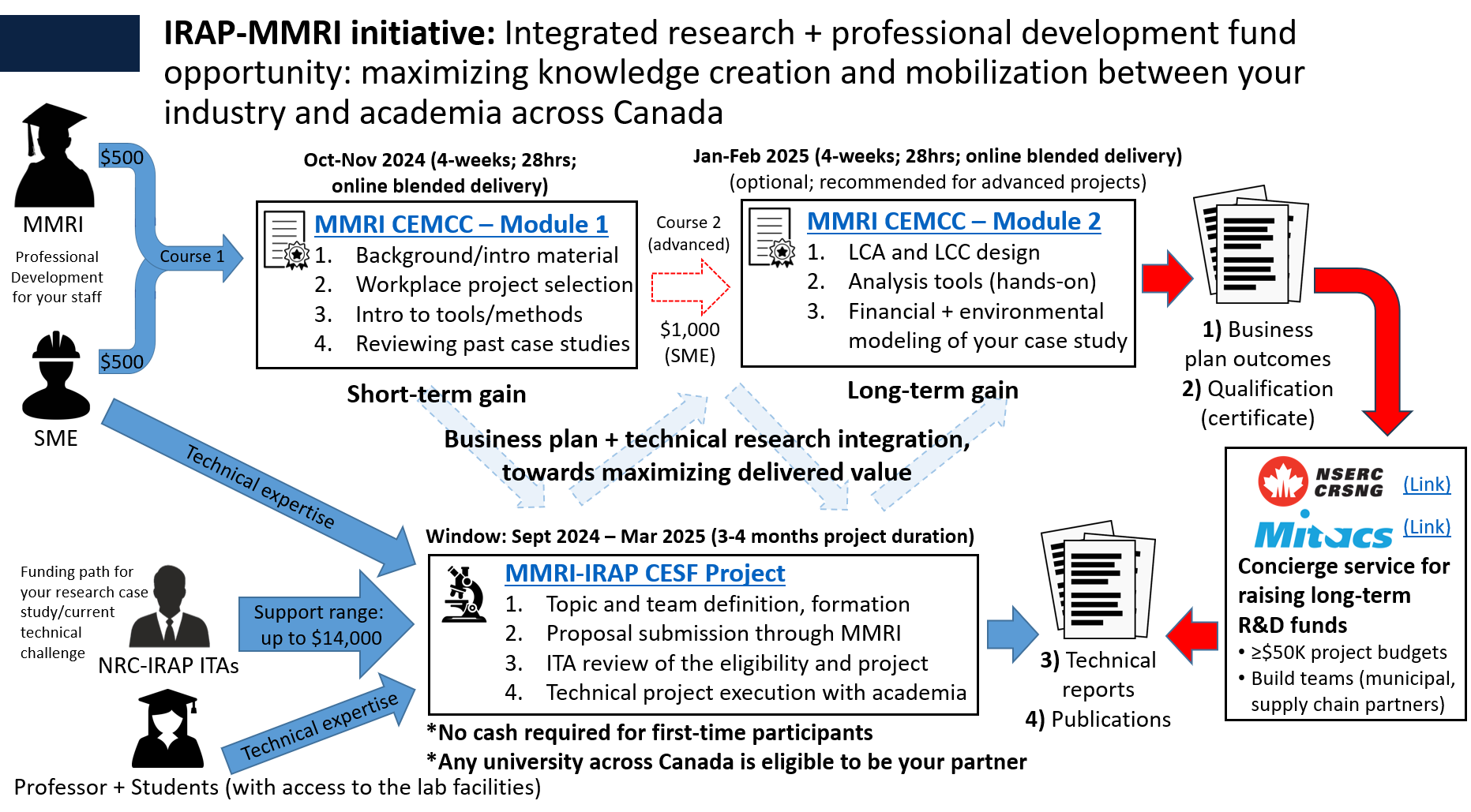A Micro-Credential Course
The micro-credential course (MCC) titled Pathways to Sustainability: Circular Economy, jointly hosted by UBC’s Materials and Manufacturing Research Institute (MMRI) and School of Engineering (SOE), aims to establish a world-class educational and applied research model, for advancing the circular economy in Canada and beyond. This 8-week course, delivered as 2 x 4-week courses, provides learners with skills to tractably understand and apply practical strategies to circularize their organization’s value chains and drive regenerative business growth. Learners will leverage case studies to practice using tools and methods, towards constructing lifecycle cost analyses of business models. This MCC will be composed of two courses that progressively build learners’ skills:
- Course 1: Principles of Sustainability in Circular Economy (4 weeks at 7hrs/week)
- Course 2: Applied Methods for Circular Economy Sustainability (4 weeks at 7hrs/week)
This MCC has been developed and launched under MMRI’s Accelerating Circular Economy (ACE) program, as a recent example of MMRI leadership and experience in the field of circular economy over the last decade. The MCC is built upon the knowledge and experiences garnered during that time, in which to-date, over 100 projects together with collaborative community partners, have raised and executed over $10M of joint research funding with industry, government and non-profits.
Of note, this MCC is highly differentiated from other offerings, by virtue of the long-term support structures and value provided to learners and their respective organizations. Beyond the skills, tools and other value offered through the MCC itself, collaborative events, R&D concierge services, and more are available to course alumni. The below flowchart describes the overall value proposition for organizations to attend the MCC, and how it ties in to downstream connecting initiatives.
- For more details on each of the initiatives depicted in the flowchart, please refer to the following sections.
- For more information about the details of the MCC, including course schedule and pricing, please see the CPE Course Registration Page
- For all other inquiries, please contact the MMRI Program Manager, Dr. Bryn Crawford (bryn.crawford@ubc.ca)

1. Micro-credential course
Enrolment in the MCC “Pathways to Sustainability: Circular Economy” will provide tractable tools and methods to learners, for investigating and analyzing the cost and environmental dimensions of various circular business models. This includes analyzing supply and value chains, towards selecting a case study in their workplace for the course project (deliverable: Project Summary), to which the knowledge and tools will be directly applied and a business case developed for downstream action. The Project Summary document aims to capture three main elements for a clear and concise overview of the case study:
-
- Narrative and context of the case study
- Introductory lifecycle analysis (LCA) and lifecycle cost (LCC) modeling using the skills and tools developed in the MCC
- A gap analysis covering the next steps for assessing feasibility and performing implementation
Registration fee funding opportunities
A – Canadian Small-to-Medium Enterprises (SMEs)
MMRI is pleased to offer additional support to Canadian SMEs. Specifically, following an initial meeting between MMRI and a given SME towards selecting a R&D case study, the registration fee for Course 1 will be subsidized at $500 (limited seats; first-come-first-serve basis). The selected case study will be developed in Course 1, as well as become a candidate funding proposal to the MMRI-IRAP Circular Economy Seed Fund (CESF) program, pending eligibility. This approach offers SMEs an integrated approach for developing circular business plans, in addition to the underpinning technologies.
To apply for this discount, SMEs are encouraged to download and complete the application form here.
Please see the following two images for more information:

B – Self-identified Canadian Indigenous learners
In order to reduce barriers for entry for Indigenous learners, self-identified members can apply for a 50% discount on the full course cost. There are six (6) total discounted seats of this type, available on a first-come-first-serve basis. To apply for this discount, please download and complete the application form here.
C – BC Employer Training Grant (SMEs and large organizations)
BC Employers can apply to the BC Employer Training Grant program, to receive 80% of the cost of training up to $10,000 per employee, with a maximum annual amount per employer of $300,000.
D- Future Skills Grant (FSG)
Individuals can apply to the BC Future Skills Grant (FSG) program, which covers up to $3,500 in eligible short-term skills training at public post-secondary institutions.
2. Addressing circular economy knowledge gaps
Given the emerging and burgeoning nature of the circular economy, there are many knowledge gaps that emerge in the pursuit of analyzing business cases and applying technologies. MCC alumni will have the opportunity to work directly with MMRI, in translating the case study from the course project (or others) into an R&D project, to solve the technical barriers needed for implementation. MMRI will assemble a team composed of community stakeholders (industry, government, associations etc.) and leading academics, addressing the needs of each R&D project. The team will be guided through assessing technical feasibility of each project, selecting suitable funding agencies (e.g., Mitacs Accelerate, InnovateBC Ignite, etc.), proposal writing, through to project launch, execution and knowledge translation. For example, MMRI administers the Circular Economy Seed Fund (CESF) program in partnership with NRC-IRAP, providing SMEs with up to $14,000 for feasibility study-scale research projects, which could build on the course project of learners from SMEs.
3. Circular economy knowledge mobilization
An annual knowledge mobilization and symposium event will be hosted by MMRI, for connecting the outcomes from the parallel initiatives associated with the MCC. In addition to the course alumni, the event will be open to the general public, as a meeting place for sharing academic and industrial research and case studies, networking, and creating a venue to discuss government policies and their impact on the circular economy landscape. This will be supported by establishing sector-specific working groups and task forces, in partnership with organizations such as Circular Economy Leadership Canada, Coast Waste Management Association, among others. Further, a data repository will be established, to share case studies more broadly. The creation and publishing of academic papers will further assist in knowledge dissemination, as well as building MMRI’s reputation as a global leader in circular economy research, further attracting high-caliber student talent and research collaborations, for strengthening complementary initiatives.
4. Circular economy shared curriculum development
Broad skills and knowledge gaps in the labour market related to the circular economy, have underpinned the need for the creation of this MCC. However, to enable a sustainable implementation of these skills and tools, it will be necessary to collaborate with post-secondary institutions across Canada, to ensure that robust and cross-functional learner pathways are established, towards training the next-generation of the labour force. This will include collaborations between faculties within UBC, as well as universities and colleges from across the country. The support garnered from MCC alumni towards building cross-institutional alliances, will be integral in defining and designing learner pathways at all levels, to ensure that new graduates are equipped with the necessary skills for tomorrow’s economy. Members of MMRI’s circular economy community will have the opportunity to provide input on and shape the direction of these courses.